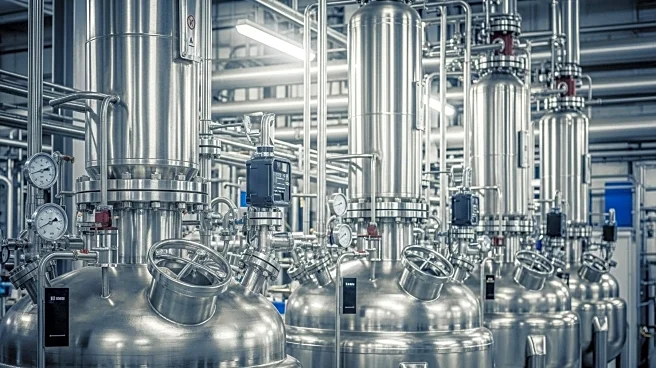What's Happening?
Sinopec, a leading energy and chemical company from China, has ascended to the top position in the ICIS Top 100 chemical companies list, surpassing Germany's BASF. This achievement is attributed to Sinopec's robust sales performance, which outpaced BASF's $67.5 billion in revenues. The top five also include US-based ExxonMobil with $55.4 billion in chemical sales, Dow with $43 billion, and PetroChina with $42.2 billion. Chinese companies have shown significant presence in the top rankings, with four of the top ten global players hailing from China. Despite Sinopec's success, the chemical industry is experiencing turbulence, with many global producers facing steep profit declines due to overcapacity and weak demand. The industry continues to navigate these challenges into 2025.
Why It's Important?
Sinopec's rise to the top spot highlights the growing influence of Chinese companies in the global chemical industry. This shift underscores the competitive pressures faced by traditional leaders like BASF and other Western companies. The broader industry is grappling with profitability issues, as evidenced by the steep declines in profits reported by many producers. This environment is prompting companies to reconsider their strategies, focusing on restructuring and asset rationalization. The continued expansion of Chinese companies could lead to further shifts in market dynamics, potentially affecting global supply chains and competitive strategies.
What's Next?
The chemical industry is expected to continue facing challenges in 2025, with sales likely to remain under pressure. Companies may shut down or divest assets while being cautious about mergers and acquisitions. Chinese companies are expected to keep expanding their capacity and strengthening their sales base, potentially climbing higher in future ICIS rankings. Meanwhile, major US and European producers may focus on restructuring efforts to adapt to the changing market conditions.
Beyond the Headlines
The rise of Sinopec and other Chinese companies in the chemical industry may have broader implications for global trade and economic relations. As these companies expand their influence, there could be increased scrutiny and regulatory challenges, particularly in markets where they compete with established Western firms. Additionally, the industry's focus on restructuring and asset rationalization may lead to job losses and shifts in regional economic landscapes.










